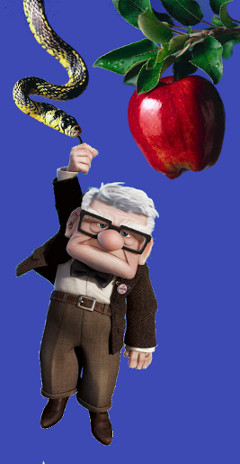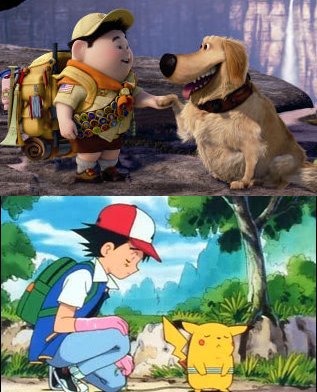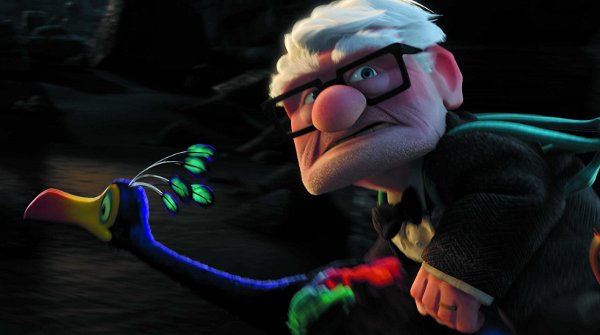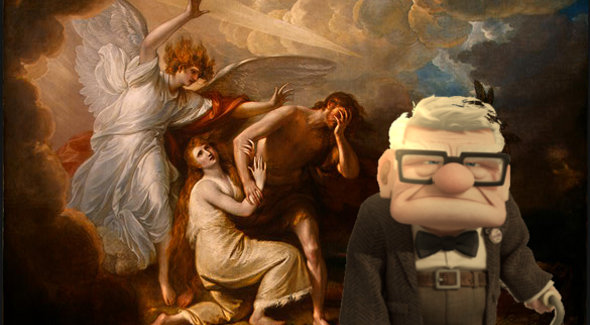
Up 2: Next Year in Jerusalem
“He caught him up, and, without wing
Of hippogrif, bore through the air sublime,
Over the wilderness and o’er the plain,
Till underneath them fair Jerusalem,
The Holy City, lifted high her towers . . .
. . . There, on the highest pinnacle, he set
The Son of God.”
– John Milton, Paradise Regained, Book IV
The kindness of the world toward your existence turns out to be an illusion of youth, and all love dies. Man must keep his faith and promises, even as he ages toward death — find a place to stand firm, even as he falls.
Pixar’s Up and John Milton’s great poems Paradise Lost and Paradise Regained are about more than what they have in common. A laundry list of their similarities would hardly be interesting (especially if you haven’t read the poems). But they meet at a critical and compelling place in what I like to call the Artistic Project.
This balloon is about to get heavy, so if at any point you need a little extra lift, bookmark this.
Now, let us go, hand in hand, with wandering steps and slow, to find our solitary way —
 I know I said no laundry list . . .
I know I said no laundry list . . .
But I should take at least a few paragraphs to substantiate my claim that these works of art are cut from such similar cloth.
Paradise Lost tells the Adam and Eve story, with a lot added about the larger universe and what comes before and afterward — a lonely man finds his perfect woman, his inspiration, and the two fall in love against the backdrop of the immeasurable beauty of the world. Then, the pair fall, are cast out of Eden, and must come to terms with a life where, instead of laying by river banks of Paradise, shagging all day without consequence and gardening at their leisure, they must work for a living in a much more mundane sort of way, free to choose where they find “their place of rest,” but knowing that it’s on the way.
In Reel I of Up, little Carl Fredriksen is a lonely boy brimming with fantasies about adventuring in exotic lands. He meet Ellie – the love of his life, his inspiration – and together they share a passion for the immeasurable beauty of the world. The pair grow up, get married, and must come to terms with a life where, instead of building their house on the crest of a plateau next to exotic Paradises Fall in South America, they must work for a living in a much more mundane sort of way. The couple is childless and Ellie dies before Carl, leaving him little in life but to choose where he’s going to spend his final years.
(This decision is forced when an elderly Carl assaults a construction worker for damaging his mailbox and is remanded to a nursing home by the courts, since it is no longer safe for him to take care of himself, and since developers want his property. By the way, the first part of Up is one of the saddest, saddest things I’ve seen in movies. The Wrestler-caliber sad, except not just for dudes. Big Fish caliber sad, except a lot of people watched it. Everyone was crying.)
In Paradise Regained, a solitary Jesus wanders in the Wilderness, tempted by Satan. In the climactic moment, he is whisked through the air to the very top pinnacle on the temple mount in Jerusalem – a symbolic high point and symbol of divinity. To defy temptation, come into his own and redeem humanity, Jesus must stand on the pinnacle — find his spot high above the ground and remain there faithfully, despite Satan’s attempts to get him to give up or jump off. The standing itself is the fundamental action of the character and the plot – the gestus, if you will.
For the rest of Up, Carl lifts his house with balloons and is whisked away to the Paradise Falls plateau. Landing on the wrong side of it, he must move his house (which he pulls on a tether “like a parade balloon”) to the perfect spot right next to the falls to keep his promise to Ellie and redeem himself. All the while, he is stalked and tempted by his childhood hero, a long-forgotten explorer who casts himself as the adversary, using an army of minions and his own personal influence to try to get Carl to fail.

Plagiarism! I Choose You! Plaaaaaaaagiaaaarism!!!
Then, the plot switches gears and starts closely resembling Pokemon the Movie 2000 (a movie I reference far too often on OTI). There’s a little Asian kid with a baseball cap who goes around collecting badges and talking about what an awesome so-and-so he is, and a really stupid yellow animal who has a lot of affection for our protagonists for no reason, and they need to fight an evil imperialistic guy in an airship because he is trying to steal this big, blue, oddly charismatic sort-of-flying creature – the rarest of all the Pokemon, er, birds.
So, yeah, laundry list plot comparisons leave something to be desired. Let’s leave that one where it lies. I’m not writing this just to talk about plot. The thematic and normative similarities between the works and the common purposes to which they speak are much more interesting.
I’m getting better! I think I’ll go for a walk!
“Why comes not Death,
Said hee, with one thrice acceptable stroke
To end me? Shall Truth fail to keep her word,
Justice Divine not hast’n to be just?
But Death comes not at call, Justice Divine
Mends not her slowest pace for prayers or cries.”
– John Milton, Paradise Lost, Book IX
It’s pretty clear that Carl Fredricksen flies to Paradise Falls to bury his wife and find his own grave. He has some food, sure, but no real plan to get more. He doesn’t even have a place set aside for pooping. He commits to this course of action thoroughly, and asks no one for pity. He never once bemoans being old. He never once in the movie expresses regret or frustration with his physical deterioration.
(Which, of course, turns out to have been less than complete – which I thought was pretty awesome. Old people are so often portrayed as frail – far more often and far more delicately than they are in real life. Of course, they no more have super powers than regular people do, but with cartoons, as with retirement planning, one must adjust for inflation).
What does he expect to have happen when he gets there? What happens in the picture, presumably – the house sits on the falls, and he gets to be with his wife.
But then, a funny thing happened. He didn’t die. More than his sense of righteousness, more than his fondness for Russell (on which more later), more than his love of adventure, and certainly more than his affection for birds or the environment, which he actively dislikes, Carl’s limited enthusiasm for doing things often seems to come from the fact that he is not yet dead.

Carl doesn't like random encounters. That's why he rides a chocobo.
Normally, that would be a pretty crappy motivation for a story that almost never gets used – and that’s deeply ironic, because it is one of the chief motivations that adults have for doing things in their actual lives. There is a huge gap here between what is good for stories and what is true about life, and I think one of Up’s chief virtues is that, like Paradise Lost, it doesn’t shirk away from facing this gap and traversing it – while remaining a good story.

Bravo.
What more can I say?
Overthinkinit.com: Pop Cultures answer to Rinzai Zen.
@Michael Williams
One thing I have always kind of exasperatedly yelled at people (which is probably why they don’t listen) is that you don’t have to get all orientalist for this kind of thinking. There are rich traditions of this sort in all cultures – there is nothing new under the sun.
I think that defying the notion that the people and culture who do cool things are people and cultures other than you and yours is one of my major motivations in writing for Overthinking It.
Well, that and the ladies. I do it for the ladies.
Yes of course. You need not go Said on me.
However, the severity of analysis does from time to time border on the Koan-like imho.
Tit for tat aside.
Who’s leg do you have to hump to get some McLuhan fused analysis around here?
I have yet to see Up myself, but just one viewing of the trailer was enough to solidify my opinion that whatever sandbox Pixar decides to play in, the end result will invariably touch upon that deep part of the human condition that, as you said, only art is able to express (or reflect). It’s funny how a metaphor- by definition an indirect representation of something else- is often the most effective means of conveying truth. Thank you for writing this, Fenzel. I now have something more to ponder on my way out of the theater when I finally have the time to see this masterpiece.
And there are still piles of snob critics out there who don’t believe anything with the name Disney (even adding Pixar) on it can be any good, or contain any serious ideas. This should start to show them.
Best final fantasy reference ever?
Up was incredible. Your analysis has some great stuff, particularly about epistemology stunting discourse, and art being a language unto itself. I completely agree, but your conclusion feels like a cop-out. If we are to subside and let the art speak for itself, then why bother writing to begin with – only to say ‘look out for these themes and see it for yourself’? I believe ideas have to be realized for each person, that the infectiousness of a truth is not contingent solely on just how much sense it makes. And so I agree that a person ought to experience a work of art in his or her own time and feel what truth is appropriate to his or her biography and present.
So why write? Personally, I write because I feel that art is being mistreated, that the masses’ approach to art is inappropriate to the art (although much art is being adapted for appropriateness to the common approach). If you have a feeling or idea, a response to Up, treat it purely. Your subjective response is in itself its own work of art, and I can learn from it. I feel as though you’re holding back.
I’m being very nitpicky though. Your thoughts are a pleasure to read, and you’ve made me want to read Paradise Lost. I’m ignorant to Milton’s work, so because of this, I at least now have interest. Thanks for the stimulating read, this strikes me as being unlike any other place writing about movies, and I think you’ve got a reader in me now.
I know nothing about Milton’s Paradise, but I found this review to be one of the most insightful ones online about Pixar’s UP. And I should know, because I scoured the web for information on UP in order to prepare for writing my own review. You can read it here.
The Spirit of Pixar’s UP
I decided to copy your style by including quotes in my review from a classic work, but in my case it is “Romeo and Juliet”. I elaborated on your Adam and Eve theme and suggested that this is A&E in reverse. Where the protagonist is heading toward the Garden of Eden instead of being thrown out of it. I also compared the story to Don Quixote and the Wizard of Oz.
I hope you get a chance to read my review and comment on it.
Yes. Best Final Fantasy reference,… well not ever but in a damn long while. I actually had to cover my mouth to quiet the horrible giggling that friggin’ picture caption got out of me, for fear of waking up other people in my house.